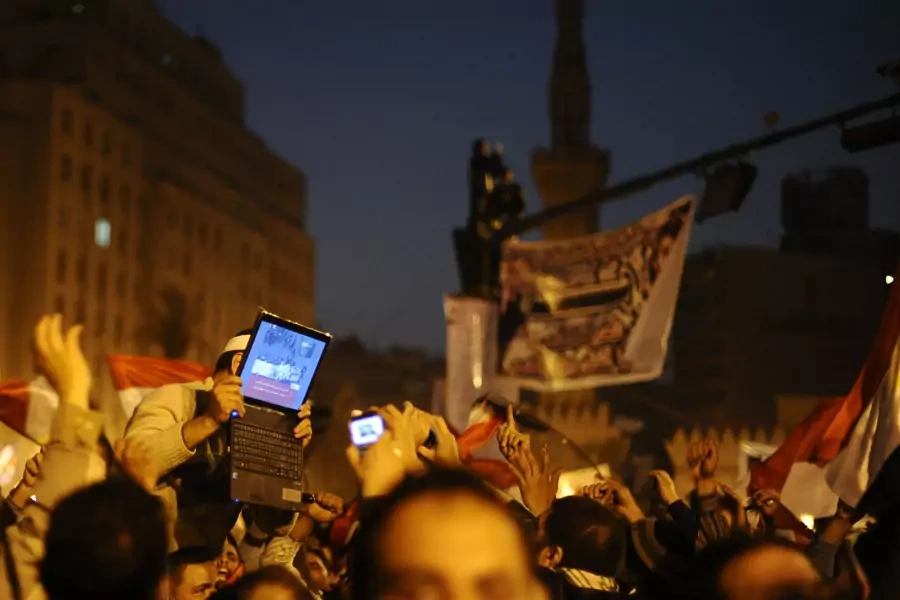In Africa, A New Tactic to Suppress Online Speech: Taxing Social Media

Babatunde Okunoye is a research officer at Paradigm Initiative. Follow him on Twitter @TOkunoye.
In 2010, protests swept across North Africa and the Middle East after a Tunisian vendor self-immolated in protest of police confiscating his cart. During those protests, activists’ skillful use of social media was pivotal in mobilizing the public and ultimately toppling strongmen like Egypt’s Hosni Mubarak. Since then, African leaders have turned to increasingly sophisticated forms of censorship to limit free speech and curb people’s ability to organize via platforms. Their most recent strategy: taxing people for using social media. Although African leaders claim they need these taxes to shore up government revenue, social media taxes are merely censorship cloaked in an economic argument.
More on:
To put Africans’ internet use into context: at least 213 million Africans use the internet, and 191 million use various social media platforms with Facebook, YouTube and Twitter being the most dominant. An influential 2016 report suggested that political discourse on Twitter is on the rise in Africa, with Africans having a higher rate of political tweets than people in the United States and the United Kingdom.
Aware of the threat that social media poses to their power, repressive regimes in Africa have employed various methods to stifle internet-based mobilization. These include internet shutdowns, targeted social media applications shutdowns, website takedowns, extensive surveillance of digital communications, online propaganda, and the detention of online critics. Paradigm Initiative’s Digital Rights in Africa reports in 2016, 2017 and 2018 reported at least 25 internet or social media application shutdowns in Africa. Its State of Internet Freedom in Nigeria report, which is produced in collaboration with The Open Observatory of Network Interference, disclosed a significant spike in the number of online critics of government arrested in Nigeria between 2016 - 2018.
In 2018, repressive governments adopted yet another tactic: taxes on social media usage. In countries such as Uganda, Benin, Tanzania and Zambia, there are now laws in place which impose daily taxes on social media and other over-the-top services. In Uganda, for instance, citizens have to pay 200 Ugandan Shillings (US $ 0.05) per day to access Facebook, Twitter, or WhatsApp as a law adopted last year. Citizens of Benin have had to pay 5 CFA francs ($0.008) per megabyte consumed through social media platforms like Facebook, WhatsApp, and Twitter as stipulated by Decree No. 2018 - 341 of July 25 2018. The decree also introduces a 5 percent fee, on top of taxes, on texting and calls. These laws also make the cost of maintaining personal websites by citizens prohibitively expensive. As a result of the Electronic and Postal Communications Regulations 2018, citizens in Tanzania now must pay a $920 fee to receive the government’s permission to maintain a website.
The backlash to these taxes has been swift. In Tanzania, civil society activists won a temporary legal challenge to stop the new blogging regulations. However, a government appeal overturned the earlier court decision, ensuring the new measures get implemented. Civil society activists in the country have nevertheless mounted a new appeal, with a new date set for the hearing in January 2019. In Benin, after weeks of mass citizen pushback via the social media hashtag #TaxePaMesMo (Don’t Tax My MegaBytes) the president ironically scrapped the tax with a tweet.
In some cases, people have simply found ways to evade the new taxes. In Uganda, many have resorted to using Virtual Private Networks (VPNs) to avoid paying the daily fee. As a result, the Ugandan government announced plans to block VPNs, though it’s unclear if the government will succeed.
More on:
Most citizens believe that these measures were drawn up to restrict the space for freedom of expression in worsening human rights contexts in countries like Uganda and Tanzania. Subtle legal and economic persuasions are being deployed to constrict the space for freedom of expression and citizens’ rights to engage robustly with the ruling class. While some of these social media taxes have been couched as measures to raise government revenue, given the poor economic situation prevalent in much of Africa, virtually everyone sees them for what they really are—attempts to stifle the right to freedom of expression and association of the millions of Africans demanding more from their governments.
Africa definitely needs solutions to its economic problems. Despite its rich mineral resource endowment, it is the world’s poorest continent. What it doesn’t need, however, are thinly disguised economic policies to stifle individuals’ ability to criticize the government’s many failings on a continent urgently in need of good leadership. Freedom of expression is a bellwether for other human rights in a society. Wherever freedom of expression is trampled upon, other human rights are also likely to be disregarded—which is sadly the case in much of Africa.
 Online Store
Online Store